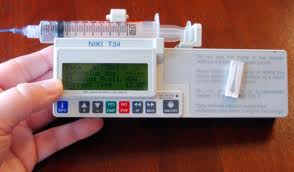When it comes to loving, nurturing, and meeting the needs of one’s children, the term “triage” doesn’t come to mind. No mother holds a sleeping baby in the wee hours of the night and ever imagines a reality in which that child’s needs rank below another’s. I certainly didn’t.
I know differently now.
On the battlefield, triage is a necessity. It’s a cruel necessity, but it saves the greatest number of lives. When there aren’t enough medical personnel and beds, you simply have to determine who needs care the soonest. But, like all the hard decisions in life, the truth is that triage – being subjective – sometimes fails. Sometimes, the fellow you thought could hold off for a couple of hours has a heart attack in the waiting room while you are tending to a trauma victim.
When you have a special needs child and typical children, triage becomes your new reality. No, it isn’t triage in the life-saving sense, but it is in every other way that matters. If you must choose between gymnastics lessons for one and speech therapy for the other, you pick speech. And, if your typical child is having problems organizing her room, that problem gets trumped by the autistic child’s penchant for throwing household objects. No, it isn’t fair. It just is. In the ER, the limited resources are beds, imaging, and experts. In the special needs family, they are mom, dad, time, money, and energy. You’d like to think that – as a mother – you are limitless. But that’s a lie we tell ourselves. The only thing a mother has without limitation is love. Unfortunately, children do need more than love.
My little girl is six years-old. Bright, enthusiastic, silly, and sweet. And, because she loves playing with other children and left kindergarten reading at a third grade level, I thought she was okay. Yes, I knew that her father has ADHD. I knew that it is statistically more likely in siblings of autistic children. I knew that she is described by so many as “high energy”. But – compared to our autistic child’s global developmental delays, meltdowns, and busy therapy schedule – her issues didn’t seem like problems.
But they were.
This past summer, it started to become obvious something wasn’t right with her. Removed from her structured school schedule and cooped up in the house most of the time, she became a child who was very difficult to live with. She began to throw tantrums that were off the scale. Our household became a very stressful place to be. It was as if she had a motor attached to her that never needed recharging. When she spoke, she shouted. When she sang, she screamed. Her play was frenzied. She demanded constant attention – to the point of deliberately annoying us to get it. And she couldn’t attend to even the smallest task by herself. What began to really worry me, however, was that she seemed oblivious to the reactions of her same-age friends. She was annoying them with her outbursts, and she didn’t even realize it.
At first, I thought she was just feeling neglected and acting out. I made a concerted effort during the summer to take her on mommy-daughter days out, trips to the library without her brother, extra time spending the night at her grandmother’s, and anything I thought would make her feel extra-special. I even had her tested for gifted, knowing that some gifted characteristics can seem like hyperactivity. But the days out became unpleasant memories of pulling her off of store displays, repeated pleas to lower her voice or stop kicking someone’s chair, and more tantrums. Her grandmother began to voice concerns about Bronwyn wearing her out. She couldn’t sit still for the gifted screening. And the library? [Insert hysterical laughter here.]
I waited until school started to see if it would help. It didn’t. And then the notes started coming home. Red cards pulled. Trips to the principal’s office. Sitting out at recess to finish assignments. She was coming home sad, angry, and confused. And, as soon as she walked in the door, she bounced off the walls – almost literally. One day, she came home upset. She said that two of her friends now didn’t like her. Apparently, her jumping around knocked over one little boy and made him angry. Her constant kicking of her friend’s desk lead to “I’m not your friend anymore.” She didn’t want to go to school in the mornings.
The rule of thumb with regard to medication and ADHD is usually, “When it begins to affect a child academically and/or socially, it’s time to intervene.” Academically, she was fine. But I realized that she was hurting socially. It was time to have the ADHD talk with her doctor.
That talk went really well. I was worried that Bronwyn would behave like a complete angel during the visit. (You know –in the same way one’s car stops making that sound when you take it to the mechanic.) Yet, bless her little heart, she sang loudly, ran around the room, and even displayed her tendency to talk so fast she has to stop to take a deep breath before continuing. The doctor saw it, and she gave us the required questionnaires for her teachers and us to fill out. (I was so happy that she showed all her ADHD tendencies in one visit that I took her to Baskin-Robbins afterward. Yes, I did.) It was interesting to compare the teachers’ perspectives to ours. I was pretty relieved to see that – when you held the forms up to one another – the ratings were almost identical in every area. I confess that part of me is still suspicious about ADHD diagnoses. As a teacher, I’ve often felt that too many kids are diagnosed and on meds. Yes, it was a relief that others saw what we were seeing.
She began ADHD meds three weeks ago. I didn’t expect to see results very quickly. But she came home that day – and every day that week – with a green (good) card. She finished all her work. She told me it was easier for her “to be good”. (Which I’ll admit broke my heart a little. In truth, there is no such thing as a bad 6 year-old.) And, when we took her to speech and occupational therapy, the therapists came out and reported that she “was a different child.” Later that day, she came home and sat at the dining room table working on a marker masterpiece – for three hours without moving. It’s kind of surreal. When she is on that medicine, she has good days. She comes home happy and proud of herself.
Things still aren’t perfect. Right now, she takes just one dose per day that seems to wear off. When it wears off, it’s just as bad – if not a little worse. She spent a few nights waking way too early, but that seems to have eased a bit. She has afternoons when she is quite emotional and unreasonable. And she has become more finicky about food. We have already adjusted the medication once. I’m hoping we can tweak things a bit to help with those issues. But, overall, I’m amazed. I’ve had a couple of folks tell me that you can tell it’s a genuine case of ADHD sometimes by how instantaneous the response is to the meds. I hope that’s true. I hope we are doing the right thing. It feels right. But self-doubt still wakes me in the middle of the night and haunts me during the witching hours of anxiety.
It isn’t the only thing that haunts me. I’m haunted by the knowledge that my baby girl sat too long in the waiting room. That – while we have been obsessed trying to meet the needs of our son – we delayed meeting her needs as well. I wonder why it all wasn’t completely obvious to me. I know how to love them equally – and endlessly. But I’m not at all sure there is enough of me to go around.
Last night, while snuggling, she asked me how much I love her. Before I got to the part about “all the way to the moon and back”, she said, “I know you love me a lot. But you love Callum just a little bit more don’t you? Because he’s special, right?” A little part of me died inside. I quickly corrected her. Tried to find the right words. Prayed she’d never forget them. It was a great many more words I can’t and would not quote verbatim. But their essence was, “Before you were born, I dreamed of you. Just you.”
I hope she believes me. I hope that one day they know I did the best I could. I hope they will forget all the ways I could have done it better and will remember all the ways I loved them instead.
And I hope they know that while triage is a necessity of the world – it has never been recognized in the heart of a mother.
“A mother’s love for her child is like nothing else in the world. It knows no law, no pity. It dares all things and crushes down remorselessly all that stands in its path.”
– Agatha Christie


 I’m guest posting at What to Expect again. If you’ve been with me a while, you might have read this one before. It’s “So You’re Wondering If Your Child Might Be Autistic”, which I would describe as a starting place for someone worried about autism in a small child. This post is one I get the most email correspondance from concerned parents. I hope it helps someone in those first days of wondering and worrying. 🙂
I’m guest posting at What to Expect again. If you’ve been with me a while, you might have read this one before. It’s “So You’re Wondering If Your Child Might Be Autistic”, which I would describe as a starting place for someone worried about autism in a small child. This post is one I get the most email correspondance from concerned parents. I hope it helps someone in those first days of wondering and worrying. 🙂
 If you want to have a relationship with him, you’re going to have to do better. He doesn’t know how to meet you where you are. You’re going to have to meet him where he is. Find out what he likes. Accept his autistic behaviors. Stop focusing so much on what you want him to be and accept him for who he is. Take joy in him now. Because the day you are hoping and praying for may very well arrive. He is still growing and developing. Still making connections and learning how to be himself in a very strange world. And the time may come when he reveals how very much he noticed all along — and asks you where you were.
If you want to have a relationship with him, you’re going to have to do better. He doesn’t know how to meet you where you are. You’re going to have to meet him where he is. Find out what he likes. Accept his autistic behaviors. Stop focusing so much on what you want him to be and accept him for who he is. Take joy in him now. Because the day you are hoping and praying for may very well arrive. He is still growing and developing. Still making connections and learning how to be himself in a very strange world. And the time may come when he reveals how very much he noticed all along — and asks you where you were.
 From the time I was a young girl, I always wanted to be a mother. I assumed that I would have my children young. (I didn’t.) And, because I never suffered with any “women’s troubles”, I also assumed that I would have a wonderful pregnancy. I had visions of pregnancy as a joyful time of eating bon-bons and wearing cute maternity clothes. For some reason, even the idea of childbirth itself didn’t trouble me particularly. I had a lot of faith in Western medicine and was confident an epidural would take care of all that. So, when I found out that I was expecting, I was thrilled. I raced out to buy my obligatory copy of
From the time I was a young girl, I always wanted to be a mother. I assumed that I would have my children young. (I didn’t.) And, because I never suffered with any “women’s troubles”, I also assumed that I would have a wonderful pregnancy. I had visions of pregnancy as a joyful time of eating bon-bons and wearing cute maternity clothes. For some reason, even the idea of childbirth itself didn’t trouble me particularly. I had a lot of faith in Western medicine and was confident an epidural would take care of all that. So, when I found out that I was expecting, I was thrilled. I raced out to buy my obligatory copy of 


 My beloved father passed away on Wednesday, May 9th. Although I am not usually at a loss for words, they are in short supply at this time. Hopefully, I’ll find them again soon. Though I’m sure many of you are rightly suspicious wordiness on my part will come sooner rather than later. 😉
My beloved father passed away on Wednesday, May 9th. Although I am not usually at a loss for words, they are in short supply at this time. Hopefully, I’ll find them again soon. Though I’m sure many of you are rightly suspicious wordiness on my part will come sooner rather than later. 😉 So I dropped all of the commenters names into a bowl and drew one. That lucky winner is: SortedMegaBlocks! Congratulations. The publisher will soon be sending a brand new copy your way. 🙂
So I dropped all of the commenters names into a bowl and drew one. That lucky winner is: SortedMegaBlocks! Congratulations. The publisher will soon be sending a brand new copy your way. 🙂 No, really. I’m planning to delete it. Like later today or something.
No, really. I’m planning to delete it. Like later today or something.



